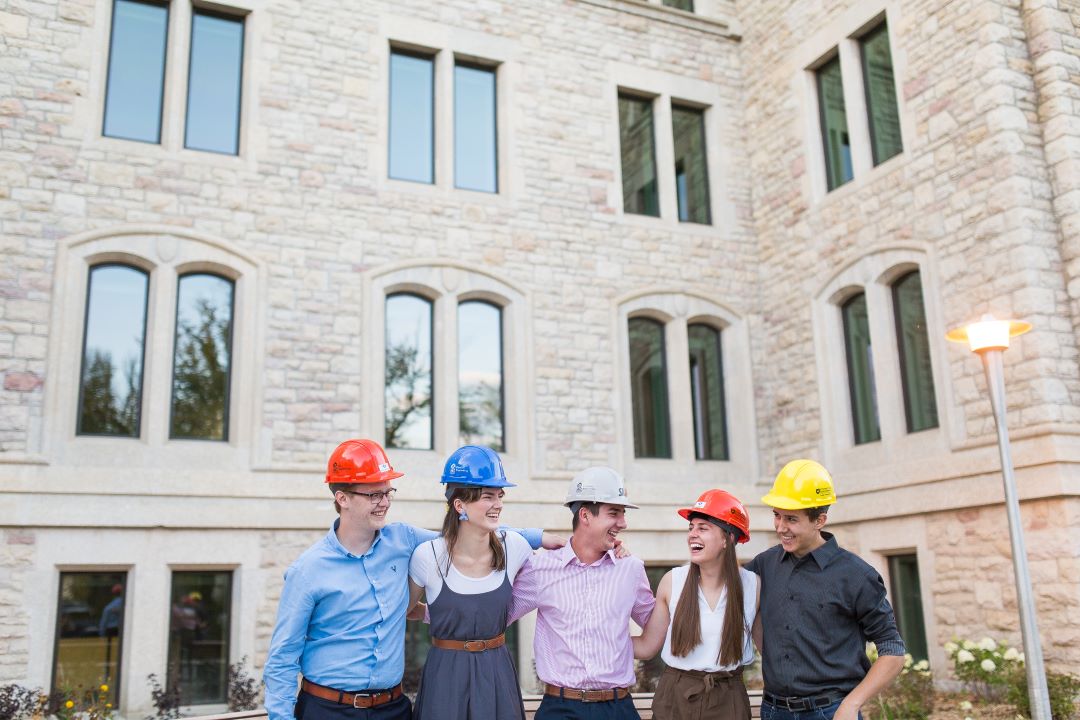
Via PostMedia Content Works: RE-ENGINEERED: Supporting student success
The University of Saskatchewan College of Engineering aims to deliver the most robust and effective first-year engineering program in Canada.
By Jenny GabruchSome innovative changes are in store when the University of Saskatchewan College of Engineering welcomes its first-year students this fall.
That's when it will introduce a newly redesigned first-year engineering program, called RE-ENGINEERED. The goal is to provide a more supportive, engaging and inclusive learning environment to help students achieve and succeed.
"The idea was that there was a better way to do this," says Joel Frey, one of the three co-leads of the team responsible for redesigning the program from the ground up, an intensive process that began in 2016.
"Our primary mission is to have students better prepared for their second year of study," says Frey, a faculty member of the Ron and Jane Graham School of Professional Development in the college and the Department of Electrical and Computer Engineering.
"We are trying to minimize academic attrition. We want to support them as much as we can to make sure they are successful."
It meant updating and modernizing the college's first-year courses, shifting assessment to a competency-based model, providing more hands-on learning opportunities and promoting a healthier school-life balance.
Frey notes today's engineering graduates need a more robust and diverse skill set than ever before. But, for the most part, engineering eduation hasn't been fundamentally revised in the past 100 years. RE-ENGINEERED will change this.
The course work won't be easier, but the new program will be more thorough and supportive.
"We never set out to make it an easier program. We set out to make a better, more effective program," says Frey.
Refocused grading
A major shift is moving away from the traditional final exam periods in December and April. Rather, students will be tested on modules of content throughout their courses, using competency-based assessment, a concept somewhat new for Canadian engineering education.
"It's not about competition for grades," says Frey. "It's about making it more accessible for the students to get what they need out of the courses to be successful as engineering students, and then as engineers."
Grades will be based on the knowledge and skills that students acquire, and they will be given chances to try again, so that their grade will not include their early attempts in the process of learning a concept.
Revitalized course content
The revitalized curriculum includes the addition of online Summer Top Up courses, such as chemistry, math, and physics. This allows students to identify and address any gaps from their high school classes, before starting their first year.
RE-ENGINEERED classes will vary in length and intensity, with material sequenced so when students acquire knowledge in one course, they can immediately apply it in another.
Rather than taking five or six classes that last the full semester, shorter courses will cover a broader range of material that will be more relevant to real-world engineering. Courses such as computer-assisted design and computer programming, for example, will make students participate in hands-on labs in various disciplines to see if their skills and interests align. Optional tutorial time and peer learning is also built into the programming.
"The best way to learn is to actually teach the concepts," says Frey. "We think it will have a powerful impact on the way students work together."
Redesigned timetable
RE-ENGINEERED introduces a consistent schedule with no night classes and a common lunch hour, so students can enjoy better time management and school-life balance. This makes it easier to take part in social and extracurriculuar activities, meet work or family commitments and fit in exercise if they choose.
The change is also conducive to a regular sleep schedule, vital for mental and physical well-being and the learning process, Frey says.
"We're hoping that it will facilitate a healthier life balance for students," he says.
Recognizing diversity
The new program aims to foster greater diversity to bolster the profession and build connections.
"We know we can best serve society with as many unique and diverse perspectives at the table making decisions, solving problems and carrying out engineering design projects," says Frey. "We've taken steps to make it a more open, accessible, welcoming and inclusive program."
An Indigenous Cultural Contextualization course has been built into the early part of the program.
"We want all of our engineering students to understand the unique relationships that exist in Canada, and certainly within Saskatchewan," says Frey. "The U of S, especially on Treaty 6 Territory and the Homeland of the Métis, has a unique place in the world."
The program is now being fine-tuned for fall 2021 delivery, with the consultancy process continuing to assess the program along the way.
"A big part of this will be feedback from students so we can adapt and improve," says Frey.

